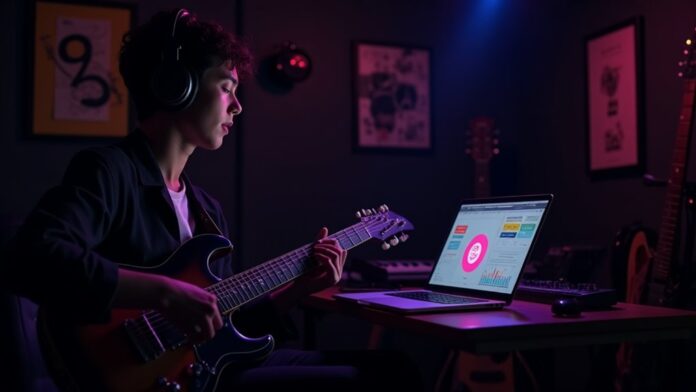Web3 is transforming the music industry by redefining traditional ownership and offering new opportunities for artist empowerment. By leveraging blockchainA decentralized ledger that records transactions across a ne, artists can directly control their content and enjoy fairer compensation through peer-to-peer transactions and smart contracts. NFTs provide new revenue streams, while bypassing intermediaries means artists retain more profit. Platforms like Audius exemplify how community-driven ecosystems strengthen artist-fan relationships and democratize the industry. Discover more about these transformative changes and their implications.
While the digital age has already transformed the music industry, Web3 is poised to revolutionize it further with its decentralized platforms powered by blockchain technology. These platforms herald a new era where artist empowerment is no longer a distant dream but a tangible reality. Web3 leverages blockchain to create decentralized music platforms, providing artists unprecedented control over their content and direct avenues to engage with fans. By bypassing traditional intermediaries, musicians can sell their work directly, ensuring a more equitable distribution of revenue and fostering genuine connections with their audience.
Decentralized platforms facilitate peer-to-peer transactions, guaranteeing fair compensation for artists without the encumbrance of intermediaries. This shift is transformative, as it allows artists to retain a larger share of their earnings and offers fans the opportunity to support their favorite musicians directly. In addition, the potential for tokenization opens new doors; artists can tokenize their music, presenting unique ownership and investment opportunities for fans. This not only diversifies income streams but also strengthens the bond between artists and their supporters, creating a community-driven ecosystem where both parties thrive.
The integration of smart contracts within these platforms further enhances the efficiency and fairness of the music industry. Automatic royalty payments eliminate delays, ensuring artists receive immediate compensation. These smart contracts streamline the payment process by reducing the need for intermediaries and provide transparent tracking of music usage and revenue generation. Consequently, artists can focus more on their creative endeavors rather than steering through bureaucratic hurdles, knowing their royalties are managed efficiently and fairly distributed based on predefined terms.
The advent of Non-Fungible Tokens (NFTs) further enriches the landscape, enabling digital ownership and new revenue streams. Through NFTs, artists can offer exclusive content or benefits, creating unique experiences for fans who invest in tokens. This model not only provides fans with a sense of belonging but also offers artists a sustainable way to monetize their work. NFT marketplaces are burgeoning as dynamic hubs for buying, selling, and trading digital music assets, further embedding this technology into the fabric of the music industry.
Community engagement is at the heart of Web3’s appeal. These platforms facilitate direct artist-fan interaction, fostering stronger connections and empowering fans to actively participate in the music creation process. Fans can invest in artists’ careers and gain exclusive content, while tokens might grant them voting rights, influencing decisions and contributing to platform governance. This participatory approach not only democratizes the industry but also cultivates a sense of community among stakeholders, aligning their interests for mutual benefit. Platforms like Audius and Catalog are leading the way in implementing these innovative technologies, offering artists and fans a glimpse of the music industry’s potential in the Web3 era.
In essence, Web3 is reshaping the music industry from a model of ownership to one of opportunity. By championing decentralized platforms and artist empowerment, it creates a more equitable and engaging environment for artists and fans alike. As this technology continues to evolve, it promises to redefine the industry’s landscape, offering endless possibilities for creative expression and community building. Initiatives such as Cointelegraph’s partnership with Audius for a remix contest showcase the real-world applications of decentralized platforms, moving beyond mere marketing stunts to foster genuine artist engagement with Web3-native communities. Furthermore, by enhancing music metadata management, blockchain technology ensures accurate attribution and revenue tracking, directly addressing one of the traditional industry’s critical challenges.



